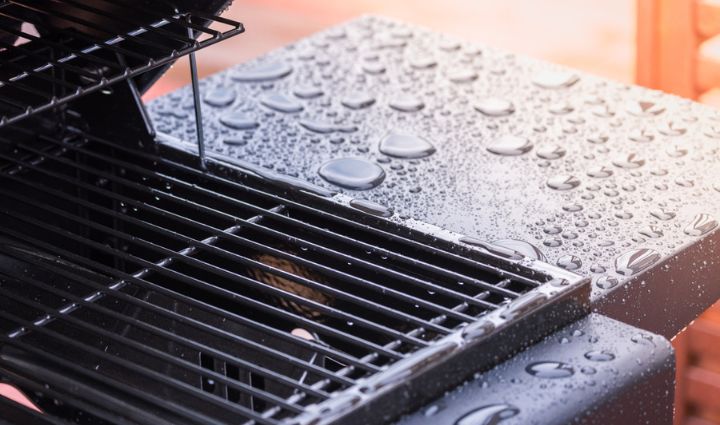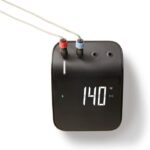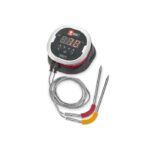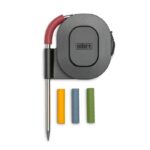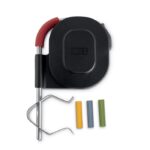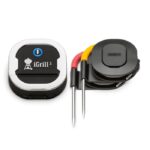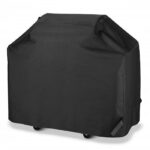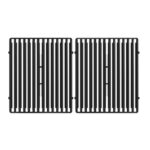No one likes a rainy cookout. However, if rain is in the forecast, don’t panic—whether your food is prepped and ready to grill or you’ve got a dozen guests on their way over, a little precipitation doesn’t need to derail your grilling plans.
Grilling while raining may not be the ideal situation, but when you’ve been preparing a brisket to smoke for the last 2 days—or if you’ve just got your heart set on delicious grilled burgers—a bit of rain shouldn’t stop you from realizing your BBQ dreams. A torrential downpour may give you pause, but if it’s more of a sprinkle than a storm, you can easily grill in the rain with just a few adjustments to your usual routine.
Grilling while raining can even offer some advantages—the increased humidity can help keep meat moist and prevent it from drying out, and you’ll be less tempted to open your grill lid, meaning you’ll likely enjoy a more even cook and a tastier result.
That said, it’s important to take a few safety precautions when grilling in the rain. In this post, we’ll cover everything you need to know about grilling while raining, including:
- Key safety information—for example, can you grill in the garage? (Spoiler alert: you can’t.)
- 5 tips for how to grill in the rain
- Gas grilling vs. charcoal grilling in the rain
Let’s get started.
Can You Grill In the Garage? 3 Safety Tips for Grilling While Raining
Rain doesn’t need to cancel your cookout, but it can pose some safety challenges when grilling. Always follow these safety tips to make sure your rainy grilling experience goes off without a hitch:
- First and foremost, never grill in your garage or any other enclosed space, even with the door open. Smoke and carbon monoxide can accumulate quickly, and they’re both deadly. Smoke may be obvious, but carbon monoxide is invisible and odorless and will spread faster than you think into your home through your ventilation system. Plus, wayward flames or sparks can easily ignite any number of dangerous materials you may be storing in your garage, such as gas in your lawnmower, motor oil, newspapers, and other flammables. Opening the garage door simply does not provide enough ventilation to make grilling in your garage safe under any circumstances. The only time it might be safe is if you can shelter outdoors under the open garage door but are not actually inside the space—as long as you have sufficient overhead clearance and proper ventilation. When in doubt, play it safe and reschedule, or move your cooking indoors if possible.
- If it’s lightning, stay indoors. Rain covers like umbrellas and awnings can be especially dangerous in lightning conditions. It’s not ideal, but if a storm is raging, it’s best to reschedule your cookout (or move your cooking indoors).
- Never use an electric grill outdoors in the rain. Charcoal and gas grills can be used in the rain with a few adjustments to your set up, but electric grills should never be exposed to water (hopefully for obvious reasons). Because electric grills don’t produce an open flame, you can, however, use an electric grill indoors. You may lose some of that classic BBQ flavor, but it’s a safe option that can save your cookout if you don’t have the option of cooking outdoors.
How To Grill In The Rain
Grilling while raining requires a few adjustments to your set up and your expectations. Read these tips for our expert advice on how to grill in the rain:
1. Rain can reduce the internal temperature of your grill
Cool rains can reduce the internal temperature inside your grill, meaning you’ll need to use more fuel to reach the right temp and stay there. Be prepared for things to take a little longer to cook and have extra fuel on hand, whether it’s a backup bag of charcoal or a spare propane tank.
GRILL SPOT TIP: Store your spare charcoal where it will stay dry. Propane on the other hand should never be stored indoors in enclosed spaces.
A good thermometer is a key tool for grilling while raining. These devices allow you to watch your grill temperature without opening the lid and letting out precious heat (and your food will stay dry too). Dual probe thermometers can be especially beneficial for grilling while raining—use one probe to keep an eye on the internal temperature of your grill, and the other to monitor the temperature of whatever you’re cooking. With a smart thermometer, you can even stay indoors where it’s warm and monitor your grilling progress on your smartphone. Just be sure not to let things burn if you’re grilling over high heat.
Shop for probe thermometers:
2. Try to stay dry
If it’s just lightly raining, a raincoat or an umbrella may be all you need to keep the fire going. If it’s raining a bit harder or you live in a climate where it rains frequently, it may be worth investing in a more permanent shelter such as a BBQ tent, a retractable awning, or even a permanently covered grilling station or outdoor kitchen. A large enough roof overhang can get the job done too.
GRILL SPOT TIP: Keep an eye on the weather forecast in the days and hours leading up to your grilling session. If you can’t reschedule or move indoors, try to set up a temporary shelter before the rain hits.
Whether you DIY your rain shelter or build something permanent, the gap between your grill and the ceiling of whatever cover you’re using should be at least nine feet tall in case of flare ups or flying sparks.
Whatever you do, never grill in your garage, even with the door open. Proper ventilation is critical when grilling, and smoke and carbon monoxide will accumulate quickly in spaces that aren’t properly ventilated.
3. Limit the impact of wind
Raindrops aren’t your only foe when it comes to grilling while raining. If wind accompanies the rain, you’ll need to protect your grill from gusts as well. A wayward gust can blow out your gas burners or kill the flame on lit charcoal.
Creating a temporary windbreak using plywood or other easily moveable materials helps prevent gusts of wind from blowing out your grill. If creating a windbreak isn’t an option and the winds are very high, turning your grill perpendicular to the prevailing wind can also help reduce the chance of windy blowouts.
4. Consider adjusting your recipe
If rain is in the forecast—heavy rains especially—it may be easier to start your cooking indoors, then finish your meal off with a quick sear on a hot barbecue. This way, you can avoid the rain and some of the challenges it poses while also achieving that delicious grilled flavor.
Another option is to opt for recipes that call for indirect heat cooking, such as brisket or ribs. It’s easier to maintain lower grill temperatures in cool rain, and you’ll need to check your food less often (especially if you’re using a smart grilling hub). Higher heat foods like steak or burgers, on the other hand, burn faster and require more babysitting. If standing outside in the rain watching your steak or burgers cook doesn’t appeal to you, you want to consider rescheduling or moving indoors if possible.
5. Dry off your grill before you store it
Putting away a wet grill is an easy way to promote rust. Instead, wait for your grill to cool down, then give it a good towel dry before you cover it back up to protect from rust and corrosion. It’s okay to leave your grill uncovered in the rain until it stops raining, as long as you give it a thorough drying—including the inside of the grill body and anywhere you find moisture—before storing it away. Heating up your grill can also help dry out the internal components so you can reduce moisture without disassembling your grill.
GRILL SPOT TIP: If you have cast iron grill grates and they got wet when grilling while raining, take some time to give them a thorough clean, and reseason them before you store your grill away. Cast iron can be especially susceptible to moisture and corrosion. Learn how to season cast iron grill grates.
How To Grill In the Rain: Gas vs. Charcoal
Gas and charcoal grills can both be used in the rain. Here’s what you need to know about charcoal grilling while raining:
- Try to position your charcoal grill so that it is covered and rain can’t seep into the charcoal. Charcoal absorbs water, and when it’s damp, it won’t light or reach the right temperature.
- Be prepared to use more coal to get your grill up to the right temperature—and to keep it there. The cooler weather will make it harder to maintain the correct cooking temperature.
For gas grilling while raining, keep this advice in mind:
- Wind can blow out your burners. Keep an eye to make sure all the burners that need to be lit are lit. If the wind does blow out a burner or two, turn off the gas, open the lid for a few minutes to let the gas dissipate (you may need to temporarily remove your food from the grill, or hold an umbrella over your food to protect it from the rain), and then re-light your grill.
- Same as charcoal, it will take more fuel to reach and maintain the right temperature. Make sure you have enough propane on hand before you get started, especially if you’re planning a long, low-and-slow cook.
Wrapping Up
If you’re wondering “can you grill in the garage?”, the answer is no, you can’t grill in the garage.
But that doesn’t mean your cookout plans are totally washed out. Whether you move indoors, create a temporary shelter, or tough it out with a raincoat, a little rain shouldn’t derail your cookout plans—but you will need to make some adjustments to your expectations and your grilling set up. The right tools can help too—a dual probe grilling thermometer or smart grilling hub are key to grilling while raining.

